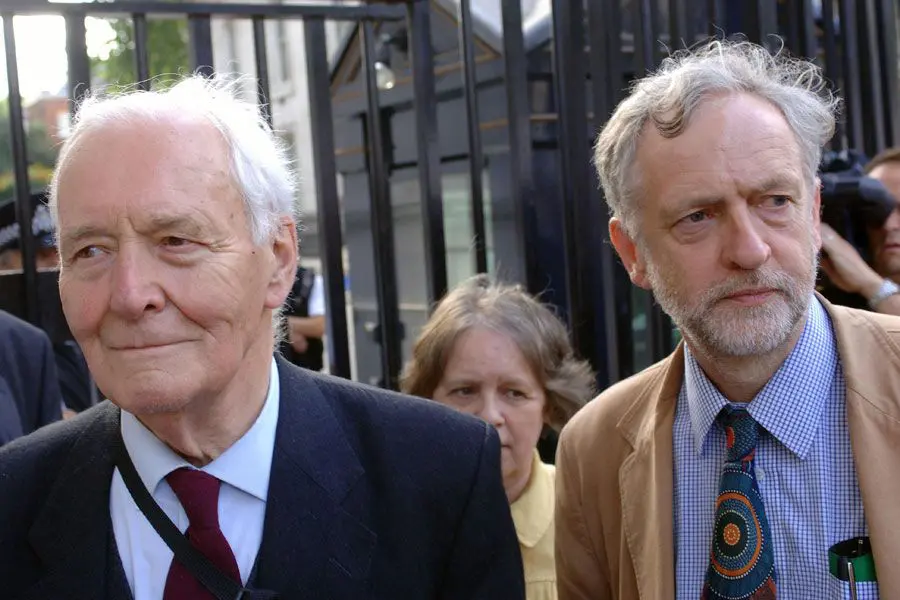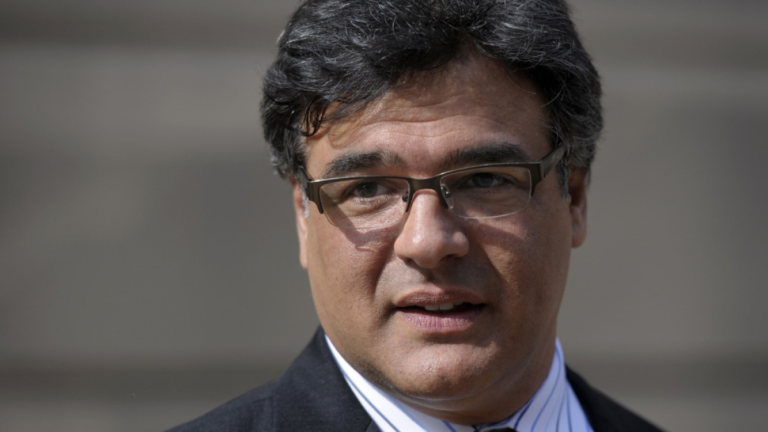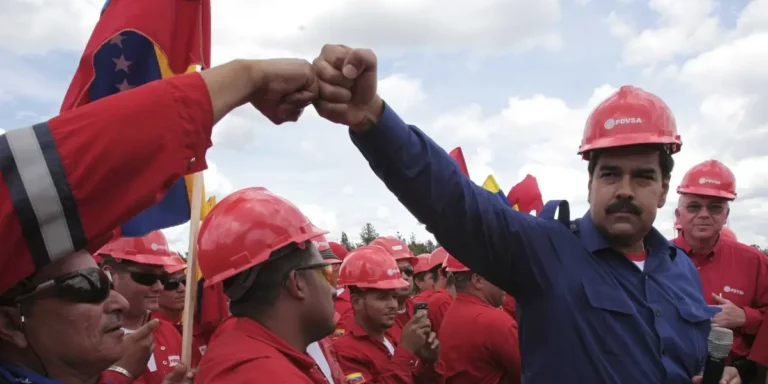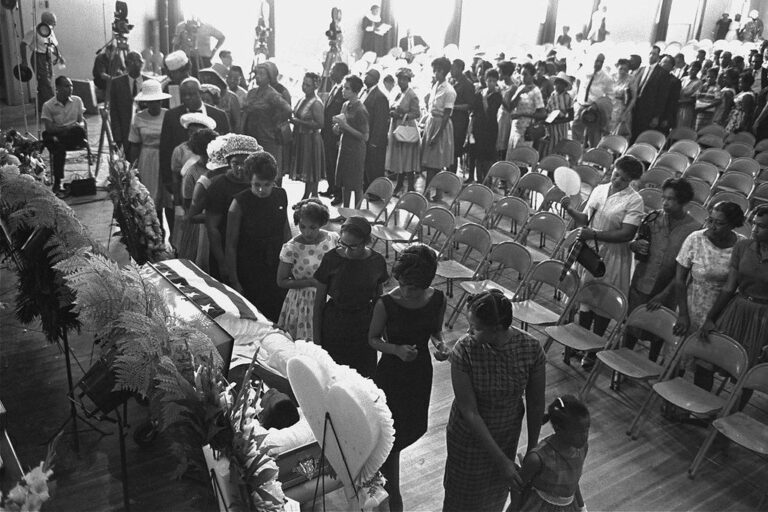The Rise of Jeremy Corbyn and Class Struggle in the UK Labour Party – RAI with Leo Panitch Pt 3/4
On Reality Asserts Itself, Prof. Panitch talks about how the Labour Party moved from being a Tony Blair party of class reconciliation and war, to a truly left mass party with more than 600,000 members that may take power. This is an episode of Reality Asserts Itself, produced March 13, 2018.
STORY TRANSCRIPT
PAUL JAY: Welcome back to the Real News Network, and Reality Asserts Itself. I’m Paul Jay, and joining us again in the studio is Professor Leo Panitch. Thanks for joining us, Leo.
LEO PANITCH: Glad to be here, Paul.
PAUL JAY: One more time, Leo Panitch is Professor Emeritus and Senior Scholar at York University in Toronto, co-editor of the Annual Socialist Register and co-author of the book with Sam Gindin, The Making of Global Capitalism: The Political Economy Of American Empire. Thanks for joining us again.
So, 1967, you head off to go to school in London. ’67 is leading the year before 1968. This is a rather tumultuous period all over the world. In terms of ebb and flow of the mass movement, this is one of the real peaks of the 20th century. Your trip to London, your trip going to school, created a lifelong connection between you and what was going on in Labour Party politics, having known Miliband and having known his kids, and then you became friends with Tony Benn, who was leader of the Left, I guess, of the Labor Party, and was a minister. Lead us up to Corbyn and today and the fight. Give us the roots of the fight that’s surrounding Jeremy Corbyn, who’s now the Labour Party leader now.
LEO PANITCH: There’s a direct thread. I arrived in the UK, not only at the time of the swinging ’60s and Mick Jagger, et cetera, but at the time of this trade union militancy, this explosion of strikes in the ’60s; was true in the States and in Canada as well. With full employment, a young worker felt that he or she could make very high-wage demands without being afraid of losing their jobs, could challenge and attempt to change what was going on in the Labour process, whether in a hospital or in a factory, right? That’s the thing about full employment, it removes the fear that workers have from being fired.
I arrived in the middle of that and saw a Labour Government passing legislation which was getting those workers repressed, which was mainly oriented for securing wage restraint.
PAUL JAY: And who was the leader at the time?
LEO PANITCH: That’s Harold Wilson, who was the Prime Minister in Britain from 1964 to 1970. The central conflict in Britain at that time appeared ironically to be between the Labour Government and the unions. And the Labour Party was a party created by the unions, which the unions funded, and which they provided the vast majority of the membership.
PAUL JAY: Sounds awfully familiar to the situation in the United States.
LEO PANITCH: Yeah. At that time it was going on as well. I became fascinated with this conflict. It appeared that the class struggle was taking place inside the party of the workers, and I ended up writing a PhD thesis on this.
Miliband’s famous book, the book that made him famous was called Parliamentary Socialism, which said that the Labour Party was most dogmatic of parties, not about socialism, but about parliamentarism; that’s how it opens. I kind of felt that yeah, that’s true, but there’s parliamentarism and parliamentarism. There are communist parties in France and Italy which were much more oriented to a marxist tradition, et cetera. There were different kinds of parliamentarism.
What really struck me about the Labour Party was that it was committed to class harmony. It was committed to reconciling the differences between workers and capitalists, and that was right in its original ideological programmatic foundation. It seemed to me that that was the difference, but that since it was a workers’ party, class struggle inevitably appeared in that party. So you’ve got this ideological attempt to say, in the national interests, we’ll all get together, while inevitably workers were going to be in a situation in which they’d engage in class struggle.
This was the central tension in the party, and I wrote a PhD thesis called Social Democracy, and Industrial Militancy was my first book — Cambridge University Press published it, which was about the conflict between the unions and the Labour Governments at that time. In the course of that, I got to know the Labour party well. Very critically came to the view that although there were many socialists in the Labour Party, they’d never be able to change the Labour Party ’cause it would split it.
PAUL JAY: Where were you when you were writing this?
LEO PANITCH: I wrote it in Britain.
PAUL JAY: In Britain.
LEO PANITCH: Finished it when I came back to Canada and started teaching at Carleton University, but I was living with one leg on either side of the Atlantic.
PAUL JAY: Somewhere around this time, your father comes to visit you in London and sees a poster of Lennon on your wall and was a little shocked by it all.
LEO PANITCH: Yeah. You know, it was very camp, and still is to have Che Guevara on your wall at that time, posters of Lenin. I happened to have one of Lennon which I’d picked up, probably in Carnaby Street, of Lenin marching along reading Iskra, the party newspaper, and I was sticking it all up on my wall with thumb tacks. He looked at it and said, “Oh, I see Rose has won,” my Aunt Rose, which I didn’t feel was all the case since I never have been a Leninist. I’ve always thought that the Bolshevik model doesn’t apply to our kinds of societies and had drawbacks even for the Russian revolution at the time, so it was highly ironic that he would say that.
PAUL JAY: All right. So, what happens to the Labour Party? As you say, its actually founding ideology is class reconciliation, and the Wilson Government was sort of the epitome of that. Then what?
LEO PANITCH: Well, out of that ferment inside the party, and out of the ferment going on with the development of new movements: the anti-war movement, the women’s movement, even the black power movement in Britain in the late ’60s, that inevitably also begins to percolate inside the Labour Party. Tony Benn, in the late 1960s, while still a minister, has a remarkable ear for that, partly maybe because he had briefly been a journalist, Paul. He had worked with the BBC in the late 1940s; was always, always very on top of new media technology as well. But he heard this, and in conjunction with the socialist left and the party, the Socialist Left, and the trade unions, after Wilson is defeated in 1970, you get a insurrection inside the party of the type that Sanders represents now.
With Benn articulating the theme in particular, that unless you can democratize the Labour Party, make Labour MPs, Labour Governments accountable to the resolutions, the more radical resolutions of the party conference, the class struggle, et cetera, if you can’t democratize the Labour Party, you’ll never democratize the British State. That’s where it has to begin. And Benn articulates that most clearly.
I was very much of the root view that this would fail, that this would lead to the party being split, because the right wing of the party had every much right to say, “But we represent the real Labour Party. You claim you’re going back to something radical before, but this is what the Labour Party’s always been.” And I thought I was right to be skeptical about it. I was sympathetic. I thought the things that they were advancing were extremely interesting and important.
PAUL JAY: You’re talking about the Tony Benn [crosstalk 00:17:31]
LEO PANITCH: The Tony Benn campaign [crosstalk 00:17:33].
PAUL JAY: What did you think was the alternative to the Tony Benn strategies?
LEO PANITCH: I was of the view, and I practiced it when I came back to Canada, that our generation, yours and mine, Paul, would find a way to create new working class parties, the last quarter of the 20th century, that would go past social democracy and leninism, that would learn from the mistakes of the communist parties and social democratic parties, which most of us by the ’60s thought had run their historical course as agents of transformative change already, and that we would find the way to a new and better politics.
A lot of people of our generation became Trotskyist or Maoist. They, in a sense, were trying to found a better Leninist Party. I always thought that they would fail because they took the Bolshevik model as their model, and that seemed to me, both in terms of discourse, language, but also party structure, insurrectionary strategy, not likely to succeed. We failed, and I think that certainly failed as a attempt to create a better Leninist Party, but those of us who tried, as I did in Canada when I came back to found new socialist parties, also failed. One has to hope that what’s going on now will lead either to a transformation of the old parties with the creation of new ones.
But as to your question, I admire that struggle, I wrote about it, I ended up writing a big book on it called The End of Parliamentary Socialism: From New Left to New Labour, from Benn to Blair, if you like, detailing how the Left in the party was defeated: their tremendous promise, their tremendous creativity.
I met Jeremy Corbyn through Tony Benn at Tony Benn’s house as a young militant in that struggle, and he was just becoming an MP; he was elected first in 1983. I met John Lansman, who was the founder of Momentum, now, as a 22, 23-year-old organizer for the campaign for Labour Party democracy and then the campaign manager for Tony Benn’s bid for the deputy leadership of the Labour Party. So I’ve known these people for a long time and admired them for a long time. I never would’ve believed after their marginalization that out of this crisis of social democracy, the way it enveloped itself in hypercapitalism, the way it embraced market solutions in the face of the contradictions of the welfare state-
PAUL JAY: Meaning Tony Blair.
LEO PANITCH: Yeah, or Clinton. And Blair modeled himself on Clinton. In fact the European social democratic parties modeled themselves on the Democratic Party of the United States, ironically, used to be that the Left United States, and to some extent still is, would look to European social democracy as their model, while what was really going on was that European social democrats were modeling themselves on the catch-all US Democratic Party.
PAUL JAY: So, the attitude you had previously towards Benn’s fight to reform and democratize the Labour Party, at the end of Benn’s process … I shouldn’t say the end. At the point of Benn’s process, you did give rise to right wings, and Blair takes over, but you do wind up with Corbyn. Does it say something about that it is possible to fight within these big essentially bourgeois parties?
LEO PANITCH: We’ll have to see. This story is not finished yet.
What it does show is that in these parties there always have been socialists, that they remained as a somewhat coherent, even for a long period, not very powerful even creative group both in parliament and inside the party branches, that that party in particular retained a working class base because of their links to the unions. But also because the class culture in Britain is so much deeper, it has so much more resonance amongst working class people, still think of themselves in class terms, much less the case in North America. That there was a seed there that when this crisis emerged, partly because of the Iraq war, partly because there’s always been a pacifist tradition, of course, in the Labour Party, but partly because of the tremendous shameful way in which social democrats everywhere cooperated with the marketization of so much of things that had never bene marketized.
PAUL JAY: And let me emphasize, in Iraq war meaning Tony Blair’s complete collaboration-
LEO PANITCH: [crosstalk 00:22:31]
PAUL JAY: … and knowingly waging in an illegal war in Iraq.
LEO PANITCH: Absolutely. Whereas people like Jeremy Corbyn had been people who had led the campaign for nuclear disarmament, kept it going as an organization into the 21st century. Now, the man who is the Chief of Staff of Britain’s largest union, United, Andrew Murray, for a long time been a British communist, was head of the Stop the War Coalition, working very closely with Jeremy Corbyn in the Labour Party. Now he’s joined the Labour Party and is part of the struggle to change the Labour Party.
Now, we’ll have to see whether this goes anywhere. It’s gone much further than I thought it would. It’s taking more creative forms than I thought it would. But the story’s not over, and it’s hard to believe that we’ll succeed without a split, without those, who know who they are, they’re not-
PAUL JAY: And a split, because Corbyn’s not taking, whether I should say moderate left of center, frankly Sander esque position, he’s gone beyond anything Sanders can. I know it’s a very different political situation, and who knows what Sanders might or may not do in that, but if I understand it correctly, he’s talking about re-nationalizing the railroads, on international politics he’s taken far more progressive positions. It’s a real left progressive position he’s taking and it seems to be very popular.
LEO PANITCH: It is. It involves re-nationalizing those public utilities, which is very popular in Britain, it involves setting up a national investment bank and regional investment banks which will serve as the infrastructure for municipalized production in all kinds of arenas. Yes, it’s significant in that respect.
That said, Corbyn is in favor of getting rid of Britain’s nuclear alternative, the Trident submarine; always has been. That’s not party policy, partly because it’s not union policy, because there are workers who work in those shipyards where the submarines are refitted, et cetera. He’s restrained, one of the people who is seen as a possible-
PAUL JAY: He said he is for getting rid [crosstalk 00:24:57]
LEO PANITCH: He is, but he is being restrained by the fact that that isn’t party policy. And he’s restrained by what exactly does it mean to try to carry through a socialist policy in Britain when the City of London, the financial sector of Britain, so dominates the whole British economy and it is the center of global finance. So even if you, as the British Left wanted to do back in the ’70s, nationalize the five big banks in Britain, what would that mean for Goldman Sachs and Deutsche Bank and all of the financial services operating in Britain? What is the implications of this?
This is not worked through, and nor will it be easy to work through. And they’re not going quite there. That’s what one needs to look for in terms of what the limits they’ll run into, but that’s going to have to be a slow, difficult process as well. They haven’t worked this out, I don’t think, and-
PAUL JAY: At the same time-
LEO PANITCH: … and you can’t blame them for having not worked [crosstalk 00:26:05]
PAUL JAY: … they do have a chance of winning.
LEO PANITCH: They do have a chance of winning, and they’re winning on a radical Left program, one that is rehabilitating the concept of socialism, that is rehabilitating the notion of politics as not simply being about electing someone to take office and then represent you for four years and then get reelected or not, that a notion of politics involves popular mobilization and education, so not only Momentum. Corbyn has just set up inside the Labour Party a branch of the party that is about community organizing.
PAUL JAY: Very quickly, Momentum, for people who don’t know, is what?
LEO PANITCH: Momentum was created at the time of Corbyn’s campaign for the leadership of the party, when he barely got enough nominations from other MPs even to put his name forward. The idea there was just to keep some Left ideas alive in the leadership campaign after the previous leader, Ed Miliband, lost the election in 2015 and resigned and there was a leadership contest. And astonishingly, there was this groundswell of support for the guy who was way out in Left field-
PAUL JAY: Corbyn.
LEO PANITCH: … seen not to be a establishment politician. One of the reasons that happened was that this organization, called Momentum, was created around the guy I mentioned before, John Lansman, who had been a young activist 30 years before in the campaign for Labour Party democracy, and tried to get Benn elected as deputy leader, et cetera. He now had been brought back by a radical Labour MP to do organizing outside the party, and he linked up with some young people, in particular some young primary school teachers, who had organized a big concert with radical music groups for Corbyn.
It had been a tremendous success in London, and they created, they led the creation of this thing called Momentum, which was to be [inaudible 00:28:17] create popular momentum behind the Corbyn campaign. It also had the effect of sweeping young people to join the Labour Party, to pay £3, at that time, become a Labour Party supporter and vote for Corbyn, and hundreds of thousands of people joined the Labour Party. This was unheard of in any social democratic party in a generation, maybe two.
The Labour Party now has almost 600,000 members. The Labour Party Youth has 110,000 members. This in itself is a revolution. And unlike the Democratic Party, there’s actually a party there. The Democratic Party is plasticine, is jello. There is no organizational structure to it. There’s no apparatus that makes the leadership accountable in any way to a conference that passes policy resolutions, a program … None of that exists. In Britain there are party branches.
PAUL JAY: Yeah, the platform at party conventions as propaganda has nothing to do with [crosstalk 00:29:19]
LEO PANITCH: Has no real effect. That’s not true in these parties. And the party branch in Britain has some meaning, it’s a place where people go, where activists go; they’re usually deadly boring. Part of what needs to go on is those branches need to become centers of working class life. They need to become open, welcoming to young people, but also oriented to going out into the community and engaging in campaigns for tenants’ rights, for women’s rights, organizing people.
The great mass parties, when they were created, played that kind of role. They were engaged in what was known then, and will have to be known again, as working class formation.
PAUL JAY: Well, as you said, the class struggles being waged in the party, and it aint over.
LEO PANITCH: That’s for sure.
PAUL JAY: And the closer Corbyn gets to possible power the more vicious that struggle’s likely to get. Because as it is, with the Democratic Party here, there’s classes in these parties, and the elites have been controlling these parties, and he aint going to let go of them very easily.
LEO PANITCH: Well, [inaudible 00:30:28] genuinely, a lot of the people who are members of parliament, and a lot of people who are party bureaucrats, some of them come from working class backgrounds, think that capitalism is the best of all possible worlds. They would like a more mixed economy, they naively would like to go back to the welfare state, but they have been persuaded to the view that any socialism is either impossible or will end up being a disaster. They have no hope, in other words. They know who they are ideologically, and they will fight for that, I mean in addition to be oriented always, to be doing the deal with the dominant class. That’s their politics, that’s what they’re good at: striking a compromise with those who have power.
PAUL JAY: And that’s how the leadership of the Democratic Party see themselves.
LEO PANITCH: Absolutely.
PAUL JAY: Nancy Pelosi and Hillary Clinton have made it clear capitalism is the best there is. We have to rein in the worst aspects of capitalism.
LEO PANITCH: I remember someone you’ve interviewed and know well, Bill Fletcher Jr., telling me back in 2007, 2008, that he knew Obama well and he knew the kind of community organizer he was. He was the kind of community organizer who would bring poor people in South Chicago together with the capitalist grandees of the Democratic Party in Chicago, put them in a room and say, “Work on a deal.”
PAUL JAY: Much of your work has been on the role of the United States and managing global capitalism. Well, at the moment, the Manager and Chief is Donald Trump, and what does that tell us about the state of America and the state of global capitalism? Thanks for joining us. Please join us for the next segment of Reality Asserts Itself with Leo Panitch, where we’re going to discuss whether in fact another world is possible. So please join us then.
Podcast: Play in new window | Download






